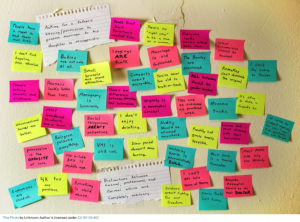My recent blog on searching for truth prompted me to take a deeper dive into what likely underlies the problems we all have when we say we are seeking the truth. Intellectuals know the root problem is most often confirmation bias which, according to Wikipedia, is “the tendency to search for, interpret, favor, and recall information in a way that confirms or supports one’s prior beliefs or values. People display this bias when they select information that supports their views, ignoring contrary information, or when they interpret ambiguous evidence as supporting their existing attitudes. The effect is strongest for desired outcomes, for emotionally charged issues, and for deeply entrenched beliefs.”
Therefore, since AI uses written and numeric data from the real world, how can it detect confirmation bias, and if it can’t, isn’t it going to recommend biased results? Plus, if the consensus on something is what AI is going to spit back at us, how do we train it to also offer contrary opinions, so we know the full story? Here are some excellent suggestions from the University of California at Merced:
“Confirmation bias can lead to miscommunications, escalating conflicts when key pieces of information are overlooked. Consider these three ways to counter confirmation bias to improve your communications, relationships and work product:
Focus on falsification bias – Confirmation bias can be a strong influence, so you will need to actively look for evidence that disproves your point of view.
Get a different perspective – Get out of your echo chamber. Approach someone you know who sees things differently from you and ask them what they are seeing. Be open to their ideas and try to explore them.
Talk with an outside party – Approach a coach or someone you trust to help you impartially explore your thoughts and beliefs without judgment.”
Well now isn’t that interesting. The key to maturing our thinking and avoiding errors in seeking truth is that we should be listening to others, especially those who disagree with our points of view. Seems like we are back at the same conclusion I recommended in my prior blog. Listen to voices that disagree with our preconceived ideas … listen … question … don’t argue. Let the diversity of thought soak in … deeply.
Now, let’s look at how AI coupled with social media can concoct a toxic cocktail. Again, from Wikipedia we learn that confirmation bias is amplified using filter bubbles, or “algorithmic editing”, which displays to individuals only information they are likely to agree with, while excluding opposing views.
Some have argued that confirmation bias is the reason why society can never escape from filter bubbles, because individuals are psychologically hardwired to seek information that agrees with their preexisting values and beliefs. Others have further argued that the mixture of the two is degrading democracy—claiming that this “algorithmic editing” removes diverse viewpoints and information—and that unless filter bubble algorithms are removed, voters will be unable to make fully informed political decisions. Therefore, our search for truth is hard work since we are fighting against both internal and external temptations to seek confirmation for what we already believe.
May our new year be filled with new and loving insights as we learn to listen to each other better. That should be a resolution we can keep if we really care at all.
2 thoughts on “Is AI Biased?”
Comments are closed.

Excellent article as always. Unfortunately confirmation bias has been with us forever and will probably always be with us in one form or another. Doing what was suggested here to try to identify and eliminate it as best we can is very important. A line from a song called The Boxer by Simon and Garfunkel came to mind. A man hears what he wants to hear and disregards the rest.
Thanks Wallace. Love the reminder in that song!!